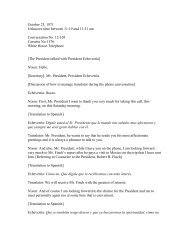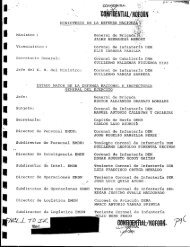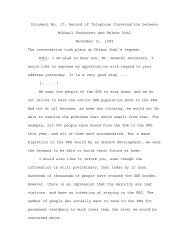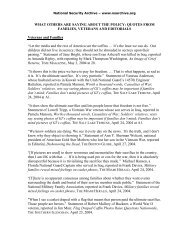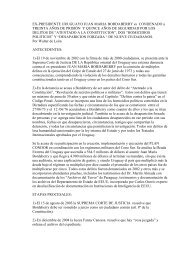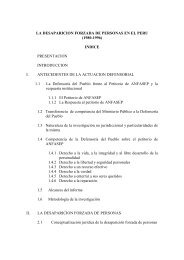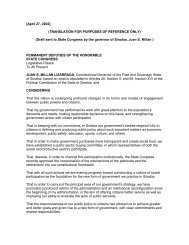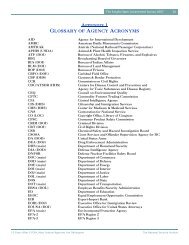Document No. 50: Memorandum of the Academic Staff of the ...
Document No. 50: Memorandum of the Academic Staff of the ...
Document No. 50: Memorandum of the Academic Staff of the ...
- No tags were found...
Create successful ePaper yourself
Turn your PDF publications into a flip-book with our unique Google optimized e-Paper software.
Mastny-Byrne 2005/04/27 13:12 Page 271Prague, May 19681. Political and Military Doctrine1.1. The political doctrine <strong>of</strong> a socialist state is primarily influenced by <strong>the</strong> choice<strong>of</strong> wider goals within <strong>the</strong> international community and its relationship with <strong>the</strong> diverseforces representative <strong>of</strong> social progress.The principle <strong>of</strong> socialist internationalism is organically linked with <strong>the</strong> nationalresponsibility <strong>of</strong> a sovereign state. This is normally more important as well as moredifficult <strong>the</strong> smaller <strong>the</strong> physical power <strong>of</strong> <strong>the</strong> state. The choice cannot solely dependon “national interest,” which cannot be defined in a pure form—nei<strong>the</strong>r as an interest<strong>of</strong> one’s own state, nor as an interest <strong>of</strong> <strong>the</strong> leading state <strong>of</strong> a coalition. The interest<strong>of</strong> <strong>the</strong> societal movement, <strong>of</strong> which sovereign states are a part, is decisive, specifically<strong>the</strong> interest <strong>of</strong> European socialism and its dynamic development. Mere defense <strong>of</strong>what has been accomplished fosters stagnation and degeneration; <strong>the</strong> wrong choice<strong>of</strong> an <strong>of</strong>fensive strategy has a destructive effect on <strong>the</strong> progress <strong>of</strong> <strong>the</strong> whole societalmovement.1.2. Military policy as an aggregate <strong>of</strong> actions in military matters implements militaryinterests and needs through a chosen strategy. In regard to national interest,<strong>the</strong> military doctrine <strong>of</strong> <strong>the</strong> state can be described as a comprehensive formulation<strong>of</strong> its military interests and needs.The doctrine is a binding <strong>the</strong>oretical and ideological base for <strong>the</strong> formulation <strong>of</strong>military policy and <strong>the</strong> resulting measures as well as for negotiations with <strong>the</strong> alliancepartners. It amounts to a compromise between <strong>the</strong> maximum requirements and actualresources, between <strong>the</strong> dynamics <strong>of</strong> <strong>the</strong> evolving military knowledge and <strong>the</strong> findings<strong>of</strong> <strong>the</strong> social sciences, between <strong>the</strong> development <strong>of</strong> technology and <strong>the</strong> requirement<strong>of</strong> an effective defense system corresponding to <strong>the</strong> military circumstances at anygiven time.1.3. The formulation <strong>of</strong> <strong>the</strong> state’s military doctrine influences retroactively its politicaldoctrine and strategy. It substantially affects its capability to project itself internationallyby nonmilitary means. Giving up one’s own military doctrine means givingup responsibility for one’s own national and international action. A surrender to spontaneity,this entails <strong>the</strong> de-politicization <strong>of</strong> military thought, which in turn leads to aparalysis <strong>of</strong> <strong>the</strong> army. It is <strong>the</strong> fundamental source <strong>of</strong> crisis <strong>of</strong> <strong>the</strong> army organism bytearing it out <strong>of</strong> society. It disrupts <strong>the</strong> metabolism between <strong>the</strong> army and <strong>the</strong> society.It deprives <strong>the</strong> army <strong>of</strong> its raison d’être for <strong>the</strong> national community by limiting <strong>the</strong>interaction between national goals and <strong>the</strong> goals <strong>of</strong> <strong>the</strong> socialist community.2. The Past, Present, and Future <strong>of</strong> Czechoslovakia’s Military Policy2.1. The foundations <strong>of</strong> Czechoslovakia’s present defense systems were laid at <strong>the</strong>beginning <strong>of</strong> <strong>the</strong> 19<strong>50</strong>s, at which time <strong>the</strong> responsible political actors <strong>of</strong> <strong>the</strong> socialistcountries assumed that a military conflict in Europe was imminent. It was a strategybased on <strong>the</strong> slogan <strong>of</strong> defense against imperialist aggression, but at <strong>the</strong> same timeassuming <strong>the</strong> possibility <strong>of</strong> transition to <strong>the</strong> strategic <strong>of</strong>fensive with <strong>the</strong> goal <strong>of</strong> achievingcomplete Soviet hegemony in Europe. <strong>No</strong> explicit reassessment <strong>of</strong> this coalitionstrategy, by taking into account <strong>the</strong> potential <strong>of</strong> nuclear missiles, has ever taken place.271




